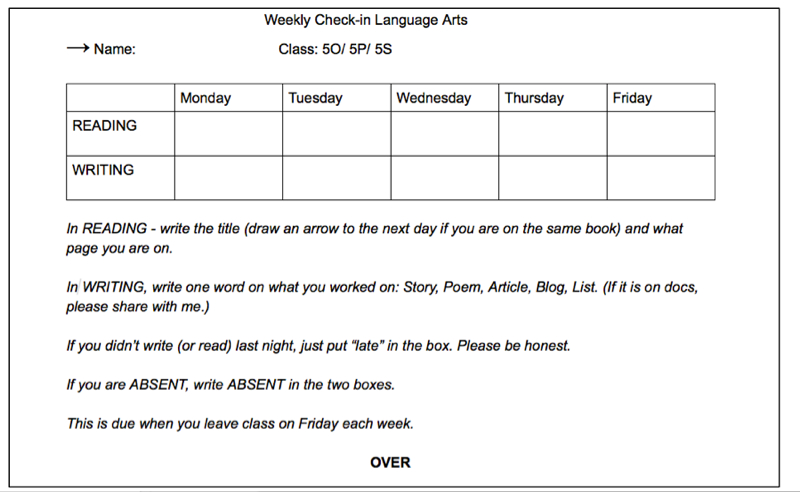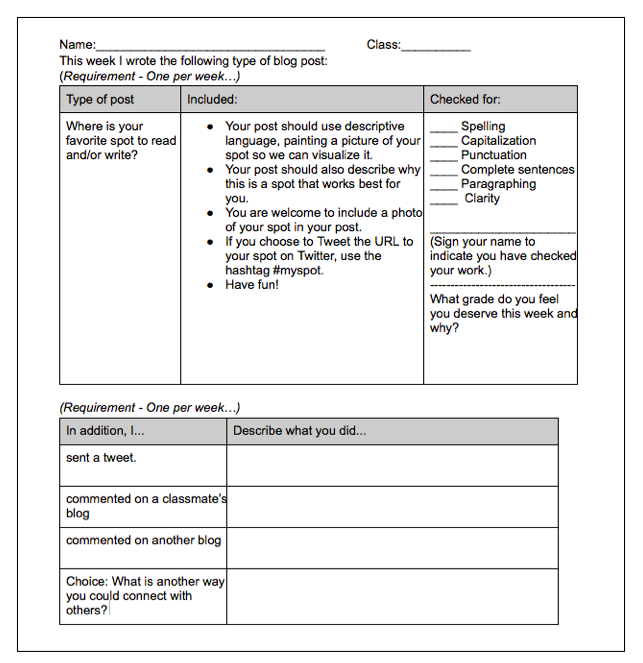I think one of the most often asked questions when you share that you teach reading and writing workshop is “What do you do for grades?” This is a tough question. Whatever I do has to be authentic. If I don’t do it as a reader and writer, I don’t ask my students to do it either. In our fifth-grade classroom, we have varying amounts of assessments each week. Any given lesson might have exit slips where we assess their understanding of a new concept. If we have reached the end of a unit, we have an assessment. These assessments are not given each week. There is, however, one assignment that the students turn in each week without fail, and that is their weekly check-in sheet.
The front page of this assignment is pretty standard. Although I do not use reading logs in the traditional sense of tracking time and requiring parental signature, I do ask the students to monitor their reading and writing each week. Our nightly homework as fifth graders is to read for 20 minutes, write for 10. What they choose to read and write is entirely up to them.

This sheet replaces the Status of the Class check-in that I use for the first quarter of the year. We begin the year with Status of the Class so that they can begin to talk about reading and writing as a class. Also, it allows me to get to know the students and their interests. When I think they are ready to take over their own check-in, we transition to this sheet. Although I see the benefit to doing the Status of the Class with them, in my short class period, it takes a long chunk of time. For that reason, we switch over in the fall.
The weekly check-in sheet is worth two grades: the front is one grade for completing their nightly reading and writing. The fifth graders truly do write “late” when they forgot to read and write, even though it means they cannot get an A on that sheet. They know we will be talking about their reading and writing during the week in conferences, so there is no point in being untrue. Also, if they forget sometimes, it is understandable. I do too. We talk about not letting it be a habit, but to get back on track. This weekly assignment is worth 10 points.
On the back of their check-in is typically a two-part assignment: a type of blog post and a chance for connection.
For the blog post: this assignment varies from a specific type of post, like this week’s, which is Persuade me to save your endangered animal (they are studying endangered animals in social studies class). We also have choice posts like Write a book review, a slice of life, a restaurant review, or an interview.
For the connection: students need to choose if they want to comment on the blog of a classmate or the blog of another student from another school, to reach out and Tweet, to write a Goodreads review, or to find another way to connect to the outside world on their own.
One example of the back of their check-in sheet could be this:

For the back, I usually make the assignment worth 20 points. You will notice that I allow them to also give some feedback about what grade they think they deserve on this work. I find that most fifth graders are far harder on themselves than I would ever dream of being. That being said, the skill of reflection is one that it is important for them to learn. I like embedding it in this weekly assignment. If I find a child who absolutely does not have good reflection skills one week, I make sure to meet with him or her for a conference the following week and discuss the assignment.
I enjoy this type of weekly assignment in our language arts class. It allows my students to begin to monitor their own time and their reading and writing. It gives them the chance to be reflective and see how they are progressing as readers and writers. And it often provides choice for the type of responses they would like to turn in. I am constantly asking them for feedback and changing the weekly assignment sheet to fit their preferences. Although finding opportunities for grades in the reading and writing workshop is sometimes more difficult, including this weekly assignment still allows for choice, authentic work, reflection, and independence.



